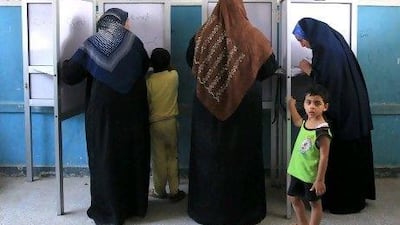CAIRO // One of the best indicators of the new Egypt is that the country had suddenly discovered opinion polls in a major way.
In the months leading up to the presidential election a multitude of polls have emerged to track the nation's electoral pulse.
"What we're seeing in Egypt is just the start," said Reem Abuzaid, a project officer with the Danish-Egyptian Dialogue Institute. The institute has joined the Ahram Centre for Political and Strategic Studies, a government-funded but largely independent think tank, to produce multiple pre-election polls. "It's an initiation of a new culture."
There have been new numbers popping up seemingly every few days - with the results heavily reported and affecting public perceptions of momentum for each candidate.
The institute's polls are generally described by other pollsters as the most credible. But there have also been competing and often contradictory statistics released by local newspapers such as Al Masry Al Youm and Al Shorouk and by the Information Decision Support Centre — a government research organisation affiliated with the Egyptian cabinet.
Tellingly, this sudden flood of polling data has failed to produce much clarity. Despite the time, manpower and funding devoted to predicting the behaviour of Egyptian voters, nobody really has any idea who is going to win this election.
"Polling here is very, very dodgy," said Hisham Hellyer, a former employee of the Gallup international polling agency. "I still think there's a large chunk of the population that are undecided. We have no idea which way they're going to go."
A Gallup survey in January revealed that 55 per cent of respondents said they did not know whom they were going to vote for in the presidential election. As the voting began yesterday, Ms Abuzaid estimated that the undecided bloc at 33 per cent — enough to swing the election in anyone's direction.
Last fall, Egyptians experienced first-hand the limitations of the new polling. None of the polls predicted the strong showing by the ultraconservative Salafist parties that came from seeming obscurity to capture nearly 25 per cent of the seats in parliament.
The failure to foresee the rise of the Salafists has prompted an extended round of speculation as to how all the pre-vote polls got it wrong. Part of the problem can certainly be attributed to shaky methodology in the still-nascent Egyptian polling industry. The Ahram Center polls are conducted in person by a nationwide team of researchers, but most of the other polls are conducted via telephone.
"Face-to-face polling remains the gold standard, but it's very expensive. Egypt is a big country," said Craig Charney, the president of Charney Research, a US-based polling firm that conducted opinion survey's before the parliamentary vote.
Telephone polling, according to Mr Charney, is "still a little skewed upwards because the poorest people tend not to use the phone as much".
"There's ways you can weight the numbers to compensate for that, but I would want to know how you did that."
But the main reason for the flawed parliamentary polls might be far more simple: the unpredictable nature of the Egyptian electorate.
"Was it that the Salafist voters were deceptive about who they were going to vote for? Or does it mean that they decided at the last minute," Mr Charney said. "I think it was the latter, judging by the large numbers of voters who said they were unfamiliar with almost all the new parties until the very end of the campaign."
One of the under-reported aspects of Egypt's new polling craze is the quiet but crucial role played in the process by a relatively obscure government agency. The Central Agency for Public Mobilisation and Statistics (Capmas) - a wing of the ministry of planning, which is run by an army general - vets all potential questions and has the right to ban prospective pollsters from asking certain questions.
Alia Abdel Hamid, a Capmas official, acknowledged the organisation's central role in the polling process, but described it as a matter of protecting Egyptian security and public morality.
"We have to agree and the security services have to agree, on any questions in a poll," Ms Abdel Hamid said. "Some questions are just inappropriate."
None of the pollsters interviewed for this article would comment formally on Capmas's role for fear of jeopardising a crucial relationship. But the red line areas seem to involve sensitive questions regarding religion and the army or the security services.
Examples of questions banned by the Capmas censors include asking how many times per day a respondent prayed, whether they had ever had any dealings with the police and what they thought of US financial aid to the Egyptian military.
"You send them the final version of your survey and they tell you questions 1 and 3 are 'outside of your theme'. That's the phrase they like to use," said one veteran pollster. "They don't have a clear political agenda, but they're run by an old bureaucratic mentality which tends toward controlling everything."
foreign.desk@thenational.ae

